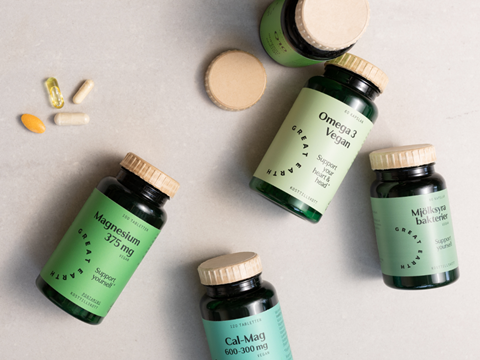
Following a successful pilot of fibre-based closures in collaboration with Blue Ocean Closures, Scandinavian company Great Earth has announced it will be implementing paper caps for all its supplement products.
Last year Great Earth adopted fibre-based closures developed by Blue Ocean Closures for its Magnesium supplements, launched online and through Swedish retailers, designed to increase recyclability and reduce carbon footprint. Great Earth says that based on thorough evaluation of the market response, production compatibility and other parameters, it has decided to exchange all its plastic supplement caps for paper caps.
Referring to consumer surveys conducted on the pilot, Great Earth states that 90% of consumers found the paper cap more user friendly, 100% viewed it as more environmentally friendly and 90% prefer the paper cap and would buy it again.
Great Earth CEO, Patrik Falk, commented: “The collaboration with Blue Ocean Closures was a fantastic opportunity. For us, this transition is about two things: driving sustainability forward and meeting the consumer of the future. The positive response from consumers and retailers shows us exactly where the future is heading, making this a business-critical decision to ensure our relevance for years to come.”
In related news, in March Elopak announced it would be investing in and becoming a co-owner of Blue Ocean Closures, aspiring to drive the shift into fibre-based beverage cartons and encourage further growth for both companies. Elopak’s investment comes with the exclusive rights to market, sell, and distribute Blue Ocean Closures’ caps globally for gable top cartons, including Elopak’s Pure-Pak and D-PAK designs.
More recently, Absolut revealed that it had successfully trialled an ‘industry-first’ paper-based cap and bottle duo in collaboration with Blue Ocean Closures, as part of its goal to create a fully biobased bottle. According to Absolut, the first generation of the cap will combine a body made of over 95% FSC certified fibres with a thin top-seal barrier made of plastic, with a long-term ambition to replace the plastic with a biobased material.
If you liked this story, you might also enjoy:
The ultimate guide to the Packaging and Packaging Waste Regulation in 2025
How are the top brands progressing on packaging sustainability?
Everything you need to know about global packaging sustainability regulation in 2025
The key to increasing the use of reusable packaging in supermarkets














No comments yet